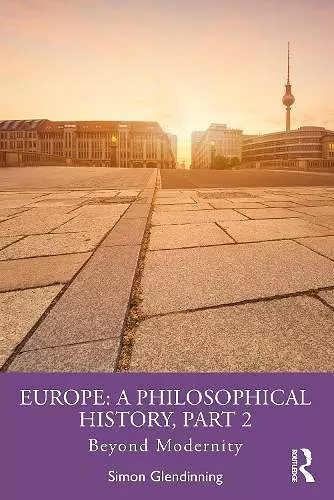Europe: A Philosophical History, Part 2
Beyond Modernity
Format:Paperback
Publisher:Taylor & Francis Ltd
Published:15th Jul '21
Currently unavailable, and unfortunately no date known when it will be back
This paperback is available in another edition too:
- Hardback£145.00(9781138580350)

Europe is inseparable from its history. That history has been extensively studied in terms of its political history, its economic history, its religious history, its literary and cultural history, and so on. Could there be a distinctively philosophical history of Europe? Not a history of philosophy in Europe, but a history of Europe that focuses on what, in its history and identity, ties it to philosophy.
In the two volumes of Europe: A Philosophical History – The Promise of Modernity and Beyond Modernity – Simon Glendinning takes up this question, telling the story of Europe’s history as a philosophical history.
In the wake of two world wars of European origin, Europe’s modern promise of universal peace, freedom and well-being for all humanity lay in ruins. In Part 2, Beyond Modernity, Glendinning picks up the story of this promise after the Second World War. Taking in Isaiah Berlin’s defence of a pluralist ideal, Francis Fukuyama’s vision of a new ‘end of history’ in liberal democracy, and Jacques Derrida’s critique of the very idea of an end of history, Glendinning invites us to affirm a new philosophical-historical self-understanding: not the history of the rational animal on the way to its final end, with Europe at the head, but a history of the unpredictably self-transforming animal without a final end. In this context, Glendinning argues, Europe remains promising, its cosmopolitan heritage opening a future beyond its exhausted modernity.
Part 1: The Promise of Modernity is available now from Routledge. ISBN 9781032015804
"There is much to be gained from every chapter of Europe: A Philosophical History, and at every stage Glendinning’s skill as reader, expositor and critic shines through." - Jonathan Wolff, LSE Review of Books
"In this remarkable two-volume work, Glendinning analyzes the ways in which European thinkers have revised their view of history since Kant. Kant believed people could, and should, work for universal peace and had the freedom to do so, but his successors thought differently. ... Marx subsequently ridiculed Hegel's Spirit (a religious notion) and called for proletarian revolution. ... Then came the onslaught of new views: Nietzsche saw contemporary society as uncreative and crass, Darwin saw humans as the product of evolution, and Freud saw humans as motivated, at least in large part, by aggression. WW I followed, as did totalitarian dictatorships, WW II, and genocide. Drawing on contemporary French thinkers, Glendinning expertly traces this philosophical history to the present, showing that Europe is now in an age of uncertainty and political manipulation. Summing Up: Highly recommended. Graduate students, faculty, and professionals." - S. Bailey, CHOICE
"In these timely volumes, the idea of Europe - the site of so much contemporary political strife - receives a philosophical interrogation commensurate with its nature. Glendinning's rigorous and compelling delineation of modern Europe's conception of itself, as at once philosophy's historical cradle and its cultural offspring, deftly draws upon the very self-understanding he analyses to confirm its current exhaustion, and to affirm its capacity for radical self-renewal."- Stephen Mulhall, University of Oxford, UK
"In this remarkable two-volume book, Simon Glendinning inhabits and works through a 'philosophical history of the philosophical history' of Europe. This is exemplary work, its readings developed with erudition, patience, and rigor. By the end of the second volume we come to see how the traditional concept of Europe is 'exhausted', but not thereby left entirely hopeless or without promise. This is a sustained, often brilliant, exercise of reading the unfolding deconstruction of the dominant European understanding of Europe, one that can indeed stand as perhaps its own best example of what the old name 'Europe' can still call forth in philosophy today. A magnificent achievement." - Geoffrey Bennington, Emory University, USA
ISBN: 9781032015828
Dimensions: unknown
Weight: 453g
260 pages